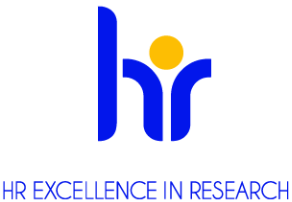What is HRS4R
The European Commission adopted on 11 March 2005 the Recommendation on the Charter for Researchers and Code of Conduct for the Recruitment of Researchers, which aims to contribute to the development of an attractive European labour market for researchers.
The European Charter for Researchers is a set of general principles and requirements defining the roles, responsibilities and rights of researchers and their employers, employers and public funding institutions.
The Code of Conduct for the Recruitment of Researchers, which does not differ much from the standard rules governing recruitment, stresses the importance of open and transparent recruitment procedures and diverse and experienced selection committees.
The Charter and the Code, known as the C&C, contain 40 principles in 4 main areas:
- Ethical issues
- Recruitment and OTM-R policy (Open, Transparent and Merit based Recruitment)
- Working conditions
- Training
In the links you can access aspects related to these areas in our University.
The Human Resources Strategy for Research (HRS4R) is a tool launched by the European Commission to support research institutions and research funding organisations in the implementation of the European Charter for Researchers and the Code of Conduct for the Recruitment of Researchers.
In 2015 the European Commission through the ERA Steering Committee on Human Resources and Mobility established a working group to work on the OTM-R System (open, transparent, merit-based researcher recruitment procedure) and to develop a guide for the improvement of procedures and practices.
On 22 April 2015, the University of Zaragoza unanimously approved in its Governing Council the adhesion to the Charter and Code of Researcher Recruitment. On 6 June 2017 our Institution received the notification from EURAXESS Rights Team of the European Commission, informing that our institution can make use of the HR Excellence in Research label.
[NEW!] On 6 December 2023, the European Charter for Researchers was adopted as an Annex to the COUNCIL RECOMMENDATION on a European framework to attract and retain research, innovation and entrepreneurial talents in Europe, which includes the principles of the Code and the Charter, but also addresses novel aspects such as research integrity, the precariousness of early research careers or the inclusion of Open Science and research evaluation reform.
Why HRS4R?
The University of Zaragoza is committed to the development of Human Resources policies based on the Code of Conduct and the Researcher's Charter and, therefore, to the development and maintenance of the HR label as a way to improve the quality of life of our researchers and to become an attractive and transparent institution for those researchers who want to develop their professional career in our institution.
Benefits for the University of Zaragoza:
- International visibility: the University of Zaragoza belongs to the group of more than 700 European research organisations with the HR label.
- Credibility and transparency: by publishing the strategy, its actions and the OTM-R policy, the University of Zaragoza reinforces its credibility and contributes to the transparency of recruitment policies and processes.
- Attraction of talent: researchers who are considering different employment alternatives will be able to know that the University of Zaragoza is concerned about the working conditions of its researchers and will be able to access the institution's human resources policies.
- Positive assessment in R&D projects: obtaining the HR seal provides project management offices with a very important tool for the management and justification of projects in which human resources policies are fundamental.
Benefits for Researchers:
- Improved working environment: Implementation of HRS4R leads to a better working environment for researchers, with policies and practices that promote wellbeing, equality and professional development.
- International recognition: HRS4R certification is recognised internationally as a quality standard in human resource management in research, which can enhance the reputation and credibility of the institution and, by extension, the researchers working there.
- Career development: Institutions with the HRS4R seal of approval offer strong career development programmes, including training, mentoring and mobility opportunities, which benefit researchers in their professional growth and advancement.
Work-life balance: The implementation of work-life balance policies helps researchers achieve a better work-life balance, which contributes to their well-being and job satisfaction.
Related documentation:

